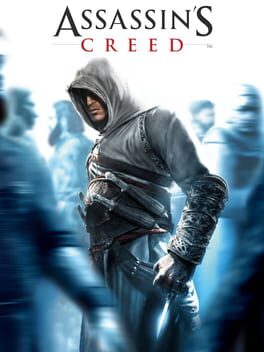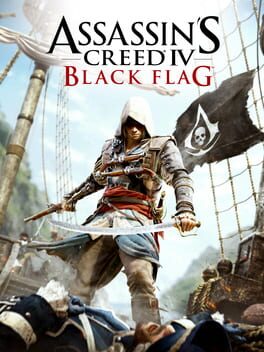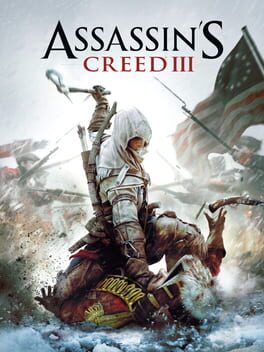ArcaneCrystal
Bio
Nothing here!
Badges

Loved
Gained 100+ total review likes

Busy Day
Journaled 5+ games in a single day

Best Friends
Become mutual friends with at least 3 others

Gone Gold
Received 5+ likes on a review while featured on the front page

Well Written
Gained 10+ likes on a single review

Popular
Gained 15+ followers

Shreked
Found the secret ogre page

3 Years of Service
Being part of the Backloggd community for 3 years

Liked
Gained 10+ total review likes

Noticed
Gained 3+ followers
063
Total Games Played
030
Played in 2024
000
Games Backloggd
Recently Played See More
Recently Reviewed See More
Desmond and Altair's stories dovetail really well to slowly reveal the philosophies of the assassins and templars, something that later games often skip over for a simpler good guys vs bad guys conflict. Desmond is a prisoner who must sneak around and scrounge for bits of information just like Altair, but he ran away from the responsibilities that Altair has to re-learn the meaning of.
The game design reflects Altair's perspective as a tool of a strange murder cult: he doesn't care about money or doing side quests that don't relate to or aid his primary mission. The crowd is just an organic mass of obstacles for him to carefully navigate around. Nuisance characters will challenge his patience, but the right decision is always to stay calm and keep hiding in plain sight. He needs to manually lock on to targets, demanding focused attention for each kill. Like Desmond, he is not exactly a free man, and always has to operate under bureaucratic approval.
The limited toolset encourages waiting for the right opportunity to move and strike, rather than clearing out every guard from a safe position. There is always a danger of getting caught if you get too greedy with high profile actions.
I love how slow and methodical climbing is, while still allowing for agile manual maneuvers in a pinch. Even the combat being all about waiting for counters kind of works with the game's focus on slow, patient observation, though unfortunately there is too much combat for that feeling to hold.
The real problem with this game is that it's already way way too much of a ubisoft open world game. 420 collectibles and 60 templars is an absurd number, but at least those are easy enough to ignore. But the map is littered with icons for too many viewpoints and too many save citizen missions, which are all just a combat sequence with the same dialogue. Not only is there icon spam but there's also audio spam, as you'll hear the same save citizen mission barks over and over, and they're so densely packed into each district that you can't miss them. The rewards are genuinely useful, but they're such a chore that I found myself ignoring them and accepting the constant barks. Honestly I'd rather clear chests in unity than do all the save citizen missions as I come across them, or check off all the viewpoints that are 30 feet away from each other.
Masyaf and Kingdom ended up being my favorite maps because they are so sparse and quiet and moody. I think the main cities would be way better if there was less content in them. I don't mind the repetitive structure of the investigations, because it fits with Altair needing to work within the system, and they always come with unique dialogue and helpful information. But the open world fluff just drags the game down so hard, which is such a shame because the atmosphere is truly unmatched in its best moments.
The game design reflects Altair's perspective as a tool of a strange murder cult: he doesn't care about money or doing side quests that don't relate to or aid his primary mission. The crowd is just an organic mass of obstacles for him to carefully navigate around. Nuisance characters will challenge his patience, but the right decision is always to stay calm and keep hiding in plain sight. He needs to manually lock on to targets, demanding focused attention for each kill. Like Desmond, he is not exactly a free man, and always has to operate under bureaucratic approval.
The limited toolset encourages waiting for the right opportunity to move and strike, rather than clearing out every guard from a safe position. There is always a danger of getting caught if you get too greedy with high profile actions.
I love how slow and methodical climbing is, while still allowing for agile manual maneuvers in a pinch. Even the combat being all about waiting for counters kind of works with the game's focus on slow, patient observation, though unfortunately there is too much combat for that feeling to hold.
The real problem with this game is that it's already way way too much of a ubisoft open world game. 420 collectibles and 60 templars is an absurd number, but at least those are easy enough to ignore. But the map is littered with icons for too many viewpoints and too many save citizen missions, which are all just a combat sequence with the same dialogue. Not only is there icon spam but there's also audio spam, as you'll hear the same save citizen mission barks over and over, and they're so densely packed into each district that you can't miss them. The rewards are genuinely useful, but they're such a chore that I found myself ignoring them and accepting the constant barks. Honestly I'd rather clear chests in unity than do all the save citizen missions as I come across them, or check off all the viewpoints that are 30 feet away from each other.
Masyaf and Kingdom ended up being my favorite maps because they are so sparse and quiet and moody. I think the main cities would be way better if there was less content in them. I don't mind the repetitive structure of the investigations, because it fits with Altair needing to work within the system, and they always come with unique dialogue and helpful information. But the open world fluff just drags the game down so hard, which is such a shame because the atmosphere is truly unmatched in its best moments.
Since AC2 these games have been about building your own economic empire, so AC4 wisely admits that you were playing a pirate all along, and makes the protagonist an appropriately greedy bastard. Of course Kenway would loot bodies, open random chests, get into a fight in every bar, take over forts, manage a fleet, and have a dedicated checklist button to make sure he doesn't miss a scrap of treasure.
Compared to AC3, the cities are less atmospheric and more functional. Fewer bespoke animations for NPCs and blending, ambient music replaces ambient noise and dialogue, and crowds move in big chunks like AC2. Again this fits with Kenway's character! He is not a guy who stops to smell the roses, He's rushing from one objective to the next to get rich as quickly as possible.
Social stealth is de-emphasized in favor of stalking through the bushes, which means there is always room to keep moving. Enemy detection is much more forgiving, encouraging aggressive hit and run tactics that fit the pirate theme, and work very well with the speed of AC3's combat and traversal. Avoiding detection in a boat involves always moving forward, just changing directions when you need to. Even in stealth, Kenway is always thinking on his feet.
And that's the biggest strength of AC4: the scenario is so well-integrated with the gameplay. The historical figures all have the same job as you, so they can actually be major parts of the story rather than cameo appearances. Kenway is an outsider to the Assassin-Templar war who drops in and out of it at his convenience, just as the player can always choose when to start the next main mission, free of the obligations that bound Altair and Desmond. You don't have to pretend to serve the Creed anymore. Welcome to the Republic of Pirates.
Compared to AC3, the cities are less atmospheric and more functional. Fewer bespoke animations for NPCs and blending, ambient music replaces ambient noise and dialogue, and crowds move in big chunks like AC2. Again this fits with Kenway's character! He is not a guy who stops to smell the roses, He's rushing from one objective to the next to get rich as quickly as possible.
Social stealth is de-emphasized in favor of stalking through the bushes, which means there is always room to keep moving. Enemy detection is much more forgiving, encouraging aggressive hit and run tactics that fit the pirate theme, and work very well with the speed of AC3's combat and traversal. Avoiding detection in a boat involves always moving forward, just changing directions when you need to. Even in stealth, Kenway is always thinking on his feet.
And that's the biggest strength of AC4: the scenario is so well-integrated with the gameplay. The historical figures all have the same job as you, so they can actually be major parts of the story rather than cameo appearances. Kenway is an outsider to the Assassin-Templar war who drops in and out of it at his convenience, just as the player can always choose when to start the next main mission, free of the obligations that bound Altair and Desmond. You don't have to pretend to serve the Creed anymore. Welcome to the Republic of Pirates.
this may be the most directionless spaghetti-on-the-wall game in the series. an unnecessarily complex trading and crafting system with the clunkiest ui ever devised. taking over forts lowers the tax rate, just in case connor needed to be motivated by bourgeois concerns too. an annoying lockpicking minigame. an underground maze game to unlock fast travel. a bunch of surprisingly challenging minigames. the boat!
the story is somehow even more of a patchwork mess than ac2. once again there are a bunch of awkward time jumps where character development seems to happen offscreen, most notably in sequence 9 where connor suddenly reveres washington and the ideals of the revolution, rather than incidentally crossing paths because the templars are involved. connor has six different motivations and juggles them from scene to scene. the haytham conflict doesn't work because they just talk past each other. daniel cross is wasted. desmond's ending is an awkward comprimise clearly borne out of internal arguments at ubisoft.
mission design is generally highly scripted, and the ui really pushes constraints such that they feel less like bonus objectives and more like stage directions that would be embarassing to fail. this generally works when it encourages slow careful play, but is annoying when it demands getting a certain amount of a certain type of kill. mission design tends to get worse as the game goes on, and the final sequence is just wretched. the captain kidd missions are dollar bin uncharted.
despite all this, the game really won me over! for one, the environments are detailed and beautiful. there are lots of cool little bespoke animations for connor and npcs (my favorite is npcs holding doors open for you). crowds are more varied, and blending is more organic. dangerous rooftops in cities encourage navigating crowds, while dangerous ground in the frontier encourages treerunning.
the weather system is cool. connor and haytham are both incredible character designs. a lot of sound effects and voice lines are strangely compressed, but overall there is a great audio atmosphere that makes up for the lack of ambient music. i loooove the boat, it's a relatively simple game of positioning and timing that explodes with the sound of waves and cannon fire and screaming.
in general i would say ac3 has fantastic base mechanics. the parkour is the best in the series, the routes are easy to read and allow for smooth horizontal and vertical movement at speed, without sacrificing the ability to do slow precise movement. the little sidestep you can do on the ground maked it much easier to navigate around corners and crowds. treerunning showcases the strengths of the system, with the modular trees making it easy to trace a path without looking too inorganic.
combat dispenses with the idea that ac is about anything other than an animation showcase for counters, and lets you build fast killstreaks with the fear system. if assassin's creed is to be a game about chases and arena fights, you can't get better than the ac3 model.
these mechanics are often let down by the main mission design, with the best missions being eavesdrops and tails that let you enjoy the atmosphere and animations. the paul revere mission also really works as a game about navigating around patrols. crouching in the bushes is balanced well with good old fashioned social stealth and observing guard movements.
but the side content is where the game really shines. hunting requires patience and careful positioning, making for better "assassination" missions than the actual contracts. almanac pages also require a more carefully planned approach than most collectibles. investigating tall tales in the frontier adds a lot of texture to the world. the boat is just awesome and it's no wonder they started building a whole game around it a year before ac3 came out.
and the homestead! the homestead is where the story is truly unlocked. connor often comes off as stubbornly naive in the main story, but it all made sense once i did the homestead. he is living in an idealized schoolhouse rock vision of american colonialism, so of course he believes in the patriots. suddenly he acquires a paladin swag: he is a guy who truly believes in something and refuses to be beaten down no matter what. it's a good flavor to mix with the mostly fatalistic tone of the main story and desmond's story, which was carried over from revelations. all the striving of men may be little more than theatre in the incomprehensible machinations of the gods, but connor is going to get a baby delivered and a wedding organized.
the story is somehow even more of a patchwork mess than ac2. once again there are a bunch of awkward time jumps where character development seems to happen offscreen, most notably in sequence 9 where connor suddenly reveres washington and the ideals of the revolution, rather than incidentally crossing paths because the templars are involved. connor has six different motivations and juggles them from scene to scene. the haytham conflict doesn't work because they just talk past each other. daniel cross is wasted. desmond's ending is an awkward comprimise clearly borne out of internal arguments at ubisoft.
mission design is generally highly scripted, and the ui really pushes constraints such that they feel less like bonus objectives and more like stage directions that would be embarassing to fail. this generally works when it encourages slow careful play, but is annoying when it demands getting a certain amount of a certain type of kill. mission design tends to get worse as the game goes on, and the final sequence is just wretched. the captain kidd missions are dollar bin uncharted.
despite all this, the game really won me over! for one, the environments are detailed and beautiful. there are lots of cool little bespoke animations for connor and npcs (my favorite is npcs holding doors open for you). crowds are more varied, and blending is more organic. dangerous rooftops in cities encourage navigating crowds, while dangerous ground in the frontier encourages treerunning.
the weather system is cool. connor and haytham are both incredible character designs. a lot of sound effects and voice lines are strangely compressed, but overall there is a great audio atmosphere that makes up for the lack of ambient music. i loooove the boat, it's a relatively simple game of positioning and timing that explodes with the sound of waves and cannon fire and screaming.
in general i would say ac3 has fantastic base mechanics. the parkour is the best in the series, the routes are easy to read and allow for smooth horizontal and vertical movement at speed, without sacrificing the ability to do slow precise movement. the little sidestep you can do on the ground maked it much easier to navigate around corners and crowds. treerunning showcases the strengths of the system, with the modular trees making it easy to trace a path without looking too inorganic.
combat dispenses with the idea that ac is about anything other than an animation showcase for counters, and lets you build fast killstreaks with the fear system. if assassin's creed is to be a game about chases and arena fights, you can't get better than the ac3 model.
these mechanics are often let down by the main mission design, with the best missions being eavesdrops and tails that let you enjoy the atmosphere and animations. the paul revere mission also really works as a game about navigating around patrols. crouching in the bushes is balanced well with good old fashioned social stealth and observing guard movements.
but the side content is where the game really shines. hunting requires patience and careful positioning, making for better "assassination" missions than the actual contracts. almanac pages also require a more carefully planned approach than most collectibles. investigating tall tales in the frontier adds a lot of texture to the world. the boat is just awesome and it's no wonder they started building a whole game around it a year before ac3 came out.
and the homestead! the homestead is where the story is truly unlocked. connor often comes off as stubbornly naive in the main story, but it all made sense once i did the homestead. he is living in an idealized schoolhouse rock vision of american colonialism, so of course he believes in the patriots. suddenly he acquires a paladin swag: he is a guy who truly believes in something and refuses to be beaten down no matter what. it's a good flavor to mix with the mostly fatalistic tone of the main story and desmond's story, which was carried over from revelations. all the striving of men may be little more than theatre in the incomprehensible machinations of the gods, but connor is going to get a baby delivered and a wedding organized.




